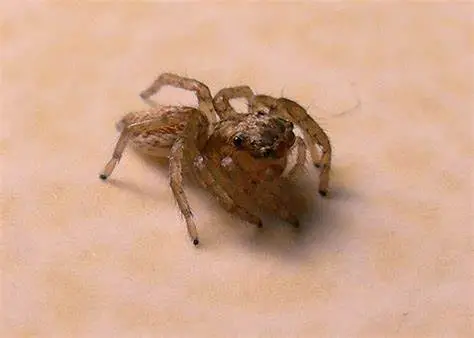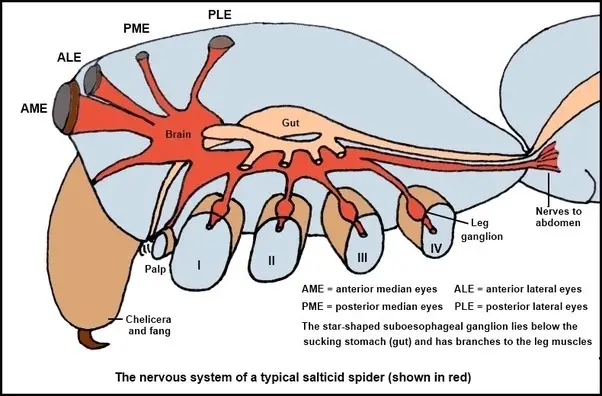Do spiders have brains? All Your Questions Answered

Image credit @ tse 2 mm Bing
The answer to the question “Do spiders have brains?” depends in parts on how you define “brain.” When we think of more complicated creatures that we raise as pets or on farms, such as cats, dogs, sheep, or cows we imagine the brain as a large data-processing machine that aids in our ability to think through complicated tasks or deal with emotions. To find a detailed answer to the question, do spiders have brains, continue reading!
Do spiders have brains?
Simply because of how “brain” is defined by anatomy experts, spiders don’t have brains. However, they do have neural cell concentrations that take up the majority of the cephalothorax’s volume. Some spiders, including jumping spiders, might have “brains” that extend into the legs. (They must require the additional cognitive power to calculate their jumps, determine how to approach prey from behind, etc.)
In contrast to other arachnids, spiders have a neurological system that is entirely concentrated in the cephalothorax. The masses of nerve tissue (ganglia) are joined by a ganglion found beneath the esophagus as well as below and behind the brain. The structure of the brain, or epipharyngeal ganglion, slightly reflects the behaviors of the spider; for example, the posterior portion of the brain is larger in touch-sensitive web builders than it is in vision-based hunters.

Image credit @ https://qph.fs.quoracdn.net/main-qimg-989c13245b39a0790c3c959e27c6d9ac
How Do All These Nerves Fit?
Even though nerves can occupy up to 25% of a spider’s body space in its legs and 80% of the body in a smaller spider, this nerve system can stretch all through the abdomen and into the legs. This can occasionally give spiders a bulging appearance on their heads and bodies because their brains protrude from their exoskeletons in the case of smaller spiders. Humans have nerves all over their bodies, but because the brain serves as the processing center for everything our nerves sense, it is large.
The reason spiders have so many nerves in their bodies and less brain function is that they don’t need to “Think” about their hunger as much as they just need to fulfill it. Instead of using a centralized center, spiders utilize all of their nerves to help with immediate activities like running, hunting, jumping on prey, or otherwise helping the spider to move fast and quickly as required. Small, slim spiders like the Brown Recluse will have a large portion of their body allocated to the neural system, but larger spiders have more room for nerves.
Do spiders have feelings?
Spiders lack the same emotional awareness as humans because they lack the same social structures. Spiders aren’t entirely immune to emotions or feelings though. According to studies, spiders form bonds with their offspring and even develop an affection for their owners.
Do spiders feel pain?
The thin, long hairs on the legs have sensory organs as well, able to detect air currents and tremors. When a spider notices activity closes, it coils up because it senses danger. An insect needs the central nervous system and the nociceptors, among other systems, to feel pain. This word defines pain as a type of discomfort that signals something is wrong in humans. Spiders, like humans, can sense if anything is wrong; it doesn’t have to be painful. They can sense their surroundings due to their nervous system and intelligence.
Do spiders have thoughts?
We have long believed that spiders are little more than automata without an inner life, similar to many invertebrates. However, we are now uncovering that some arachnids have hidden cognitive capacities that rival those of birds and mammals such as the capacity for surprise, complex learning, and foresight and planning.
Do spiders have a memory?
Researchers discovered that spiders not only remembered catching something but also memorized the characteristics and quantity of the prey. Long believed to be a hardwired behavior in these little species that did not require much mental processing power or memory. So, do spiders remember you? Most likely, spiders can’t remember your face. Because of their weak vision, spiders are unable to distinguish your face in the first place. Although some spiders, such as jumping spiders, have exceptional vision, they may not remember you because they are not naturally required to distinguish faces.
How intelligent are spiders?
While spiders can’t count to one two three, research reveals that some jumping spiders acquire a sense of numbers similar to that of a one-year-old human. Even though they are tiny, spiders are pretty intelligent at using the tools that have been given to them. Black widows recognize the shape and size of their prey and can remember the position in their web hours later, whereas jumping spiders have been found to take a circuitous route to surprise their prey.
The Fringed Jumping Spider, also recognized as Portia Fimbriata or simply Portia, is regarded as the most intelligent spider in the whole known world. It is a spider hunter that changes its hunting techniques and picks up on situations as it goes along.
Conclusion:
Spiders often explore their environment by detecting vibrations in their webs as a means of making up for their poor vision. To do that, they even adopt a certain posture in which they extend their two front legs apart while remaining still. When discussing physiology, there are far too many online resources that exclusively consider concepts related to humans, mammals, or vertebrates. However, you won’t discover much information if you’re interested in knowing do spiders have brains. Spiders lack brains yet have rather large bodies and complex nervous systems.
FAQs:
Can spiders sense a human?
The most recent study, however, demonstrates that spiders’ leg hairs are so sensitive that they can recognize the human voice from a distance of several meters.
Can spiders sense fear?
The theory has not been proven, but it seems possible that spiders are able to sense human fear. There have only been a few research on this subject, thus there is no firm conclusion. Animals with varied sensory systems may recognize various stimuli.
What kills spiders instantly?
Pour equal quantities of white vinegar and water into a spray bottle. Then, get ready to spray anytime you notice a spider because the vinegar’s acidity will instantly kill it.
Do spiders get angry?
This aggression is genetic. While more aggressive spiders are quicker to react to both prey and predators they also are more prone to attack and cannibalize the males of their species as well as their own eggs. They can thus handle themselves better when a crisis arises.

